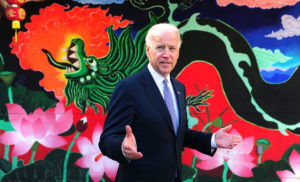Less than six weeks after Xi Jinping doubled down on his Zero Covid strategy, a swelling sea of discontent is finally breaking on its rocks. Outside the dining halls of two of the country’s most prestigious campuses, Peking University and Tsinghua University, small crowds of students risked their liberty over the weekend by chanting “freedom of expression, democracy and the rule of law”. According to one count, as of midday yesterday, there had been protests at more than 80 other universities, including in Shanghai and Beijing.
Few of these protests have been quite so explicit in their demands — their defining slogan is a blank piece of paper. Borrowing from the experience of dissenters in Hong Kong and Singapore, they are defiantly saying nothing at all. The act itself is the protest; the challenge to the authorities is clear: find a pretext to stop me. So far, the prize for the most obscure placard goes to the students holding up sheets of paper bearing a mathematical formula describing “the expansion of space in homogeneous and isotropic models of the universe within the context of general relativity”. It’s a Friedmann Equation, get it? “Freed man”… These are not slogans that are going to connect with the masses.
These students have endured long lockdowns with no end to Zero Covid in sight. But for weeks their ennui has lacked a focus. We’ve seen absurdist performances, including groups crawling around on all fours and tens of thousands taking cardboard dogs for walks. Now, however, something has shifted. The deaths of at least 10 Uyghur people in a fire, apparently while locked in their apartment block in Urumqi, the capital of Xinjiang province, and violent protests by workers at the vast Foxconn plant in Zhengzhou have triggered a sense of purpose. The final straw may have been the sight of huge crowds of unmasked football supporters at the World Cup in Qatar broadcast to every television and mobile device in China, a reminder that the rest of the world has moved on from Zero Covid.
It hardly needs stating that this is a delicate moment for the Communist Party. Giving the protestors what they appear to want — a relaxation of Covid controls — will almost certainly lead to a massive wave of death across the country. The impact of many Covid variants on a poorly vaccinated population of 1.4 billion, and the medical services that sustain them, will be catastrophic.
But not giving the protestors what they want will also cause the pressure on the system to increase. Prospects for many young people in China are bleak. Official youth unemployment stands at 18%, with hundreds of thousands of Chinese parents voting with their wallets and sending their precious offspring to study abroad. As growth continues to slow at home, even those studying at elite institutions feel pessimistic.
Yet what do these young people actually want? It is not even clear that they know the answer. The fact that some protestors were singing the Internationale doesn’t make them revolutionaries. The Leftist anthem, like the blank pieces of paper, is a plausible alibi; choosing to sing the Communist Party’s official tune is merely an attempt to create a bit of political shelter. They might as well yodel: “You don’t have any reason to arrest us.”
It is unlikely that this will cut much ice with the Communist Party, however. If the Party wants to snuff out collective action, it doesn’t need to worry about legal niceties. The catch-all charge of “Picking quarrels and provoking trouble” is usually enough to quash any unauthorised activity. Arresting the few students who were shouting “down with Xi Jinping” will probably be enough to discourage the others. There is, after all, no organised protest movement — just tens of millions of pissed-off people.
Nonetheless, the Party is in a quandary. Its bureaucracy is struggling to reconcile the leadership’s contradictory instructions. Earlier this month, the Standing Committee of the Politburo ordered a new approach to controlling the virus, ostensibly allowing local authorities to have greater flexibility in imposing lockdowns. It appeared to be a “having-its-cake-and-eating-it” strategy: a “smarter” approach to Zero Covid that simultaneously kept a lid on infections while reducing control measures in lower risk localities.
The reality appears to be the reverse. The disease is spreading, more than a quarter of the total Chinese population appears to be living under some kind of lockdown and discontent is rising. At the sharp end of local administration, where the Party’s neighbourhood warden system (shequ) faces the residents they monitor and manage, confusion abounds.
Danson Cheong, China Correspondent of the Singapore-based Straits Times, yesterday described the buck-passing between the shequ in his neighbourhood, the company that manages his apartment block and the central government’s Centre for Disease Control (CDC). A positive Covid case was discovered and the shequ ordered a lockdown, but the property company refused to impose it without an order from the CDC. The CDC was backlogged with other cases and couldn’t issue the necessary paperwork, so no lockdown was imposed and the residents of the block were left free to spread the virus.
This would not have happened at the start of the pandemic, when the political pressure to impose a lockdown would have overridden any jobsworth who attempted to stand in the way. But now at least a few jobsworths feel empowered to drag their heels and avoid a conflict with the people they must face every day. A breakdown of order is becoming crystallised, but inside the bureaucracy rather than on the streets. And this will terrify the leadership.
Hidden from view, this insecurity will be driving divisions within the system, between critics of both Zero Covid and Xi Jinping himself. There will be those with axes to grind and others with wider agendas. Yet Xi hasn’t risen to the top without learning how to deal with challenges along the way. He has been ruthless in dealing with apparent plots against him, while October’s Party Congress saw him place his allies in all the key positions.
Meanwhile, outside the corridors of power, the Party has mastered the dark arts of public opinion management and social control. Its officials may have decided to allow a little release of the pressure on campuses and a few city streets in order to stabilise the overall system. By Saturday, for instance, the state media had started to challenge the narratives that fed the initial dissent over the fire in Urumqi and the protests in Zhengzhou, reporting that lockdown restrictions could soon be eased. At the same time, directives are presumably being issued to party units to step up their vigilance and “seriously” implement their instructions.
Anyone who doubts the Communist Party’s determination to remain the country’s sole political force clearly hasn’t been following events in Hong Kong, Xinjiang or anywhere else in China for the past decade. Whenever there has been a choice between control and disorder, the Party has chosen control, even at the expense of reduced economic growth and popular dissatisfaction. That is why, for all the bravery of the weekend’s anti-lockdown demonstrators, they will not succeed. Yes, the Party faces another systemic problem — but it will take more than a few photogenic protests to make them change course.
Disclaimer
Some of the posts we share are controversial and we do not necessarily agree with them in the whole extend. Sometimes we agree with the content or part of it but we do not agree with the narration or language. Nevertheless we find them somehow interesting, valuable and/or informative or we share them, because we strongly believe in freedom of speech, free press and journalism. We strongly encourage you to have a critical approach to all the content, do your own research and analysis to build your own opinion.
We would be glad to have your feedback.
Source: UnHerd Read the original article here: https://unherd.com/




